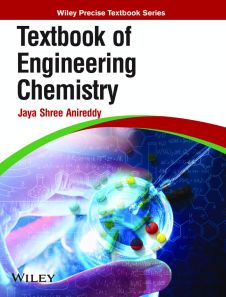Textbook of Engineering Chemistry
ISBN: 9789357460972
516 pages
Publication Year: 2023
For more information write to us at: acadmktg@wiley.com

Description
The objective of Engineering Chemistry is to build a solid foundation in the fundamentals of chemistry and an interface of theoretical concepts with their industrial/applications. This book is designed as an introductory course in Engineering Chemistry with complete coverage and is in accordance with the latest syllabus of JNTU. It aims to impart students with in-depth knowledge of various aspects of chemistry as applied to engineering. It extends the application of basic concepts of chemistry to understand Water and its Treatment; Electrochemistry, Batteries, and Corrosion; Energy Sources; Engineering Materials; Polymers; and Spectroscopic Techniques.
Preface to this Edition
About the Author
1. Water and Its Treatment
1.1 Sources of Water
1.2 Impurities in Water
1.3 Hardness of Water
1.4 Determination of Hardness of Water
1.5 Disadvantages of Hard Water
1.6 Alkalinity of Water
1.7 Analysis of Water
1.8 Water Quality Parameters
1.9 Municipal Water
1.10 Treatment of Water for Domestic Purposes
1.11 Boiler Feed Water
1.12 Techniques for Water Softening
1.13 Wastewater
2. Electrochemistry, Batteries, and Corrosion
2.1 Electrical Conductance
2.2 Electrochemical Cells
2.3 Electrode Potential
2.4 Galvanic Cells
2.5 Nernst Equation
2.6 Measurement of EMF of the Cell
2.7 Reference Electrodes
2.8 Electrochemical Series
2.9 Types of Electrodes
2.10 Glass Electrode
2.11 Quinhydrone Electrode
2.12 Batteries
2.13 Zinc–Air Batteries
2.14 Classical Batteries
2.15 Modern Batteries
2.16 Fuel Cells
2.17 Photovoltaic Cells
2.18 Corrosion in Metals and Alloys
2.19 Corrosion Cell
2.20 Theories of Corrosion
2.21 Types of Electrochemical Corrosion
2.22 Other Types of Corrosion
2.23 Factors Influencing Rate of Corrosion
2.24 Corrosion Control Methods
2.25 Protective Coatings
2.26 Metal Finishing
2.27 Electroplating Process
2.28 Cathodic Protection
2.29 Surface Preparation for Coating
2.30 Electroplating of Chromium and Silver
2.31 Electroless Plating
3. Energy Sources
3.1 Classifications of Fuels
3.2 Calorific Value
3.3 Determination of Calorific Value
3.4 Combustion
3.5 Solid Fuels – Coal
3.6 Proximate and Ultimate Analyses of Coal
3.7 Coke
3.8 Biofuels
3.9 Liquid fuels – Petroleum
3.10 Power Alcohol and Synthetic Petrol
3.11 Gaseous Fuels
3.12 Rocket Propellants
3.13 Explosives
4. Engineering Materials
4.1 Cementing Materials
4.2 Lime
4.3 Cement
4.4 Smart Materials and Their Engineering Applications
4.5 Lubricants
4.6 Surfactants
5. Polymers
5.1 Terminology
5.2 Classification of Polymers
5.3 Types of Polymerization
5.4 Mechanism of Addition Polymerization
5.5 Plastics
5.6 Some Important Commercial Thermoplastics
5.7 Fiber Reinforced Plastics (FRP)
5.8 Some Important Commercial Thermosetting Resins
5.9 Elastomers (Rubbers)
5.10 Some Commercially Important Synthetic Rubbers
5.11 Conducting Polymers
5.12 Semiconducting Polymers
5.13 Natural Polymers (Biopolymers)
5.14 Ion Exchange Resins
5.15 Biodegradable Polymers
6. Spectroscopic Techniques and Applications
6.1 Electromagnetic Radiation
6.2 Molecular Spectroscopy
6.3 Basic Spectroscopy Instrumentation
6.4 Infrared Spectroscopy
6.5 NMR Spectroscopy
6.6 UV–Visible Spectroscopy
Key Terms
Objective-Type Questions
Review Questions
Numerical Problems
Answers
Experiments

